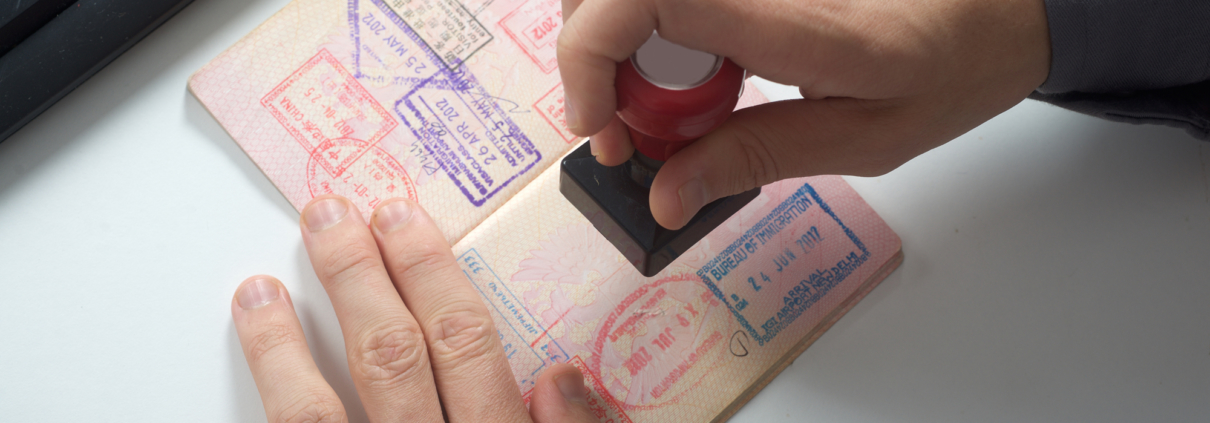New United States Entry Requirements for International Travel
(October 2021)
What You Need to Know
Effective November 8, 2021 the United States entry requirements allowed fully vaccinated foreign nationals to travel to the United States through both land and air borders.
TI has provided a summary of the new program, along with frequently asked questions to facilitate your global travel program.
The U.S. initiated international travel bans during the early days of the pandemic, adding countries and then extending the deadline while the global community focused on combating the virus. Highly urged by the international travel community, the ban is being lifted for fully vaccinated travelers from China, Iran, the Schengen Zone (which encompasses 26 states in Europe, including France, Germany and Italy), along with Ireland and the United Kingdom, Brazil, South Africa and India. Travelers from countries that were previously allowed to enter the U.S. (including Mexico and Canada via air) will no longer be allowed to enter if not fully vaccinated. The entry details provided are for the first phase, with an expected second phase to be introduced in January of 2022.
Frequently Asked Questions
Who can enter the United States?
The policies allow fully vaccinated non-citizen, non-immigrant travelers to enter the United States. This includes foreign nationals arriving from countries that have been subject to bans — China, Iran, Europe’s Schengen area, the United Kingdom, the Republic of Ireland, Brazil, South Africa and India.
Which vaccines are accepted?
The US Centers for Disease Control and Prevention has confirmed that all FDA-approved and authorized vaccines, as well as vaccines that have an Emergency Use Listing from the WHO, will be accepted for entry into the United States. This includes AstraZeneca, Pfizer, Moderna and Johnson & Johnson/Janssen. The Sputnik V vaccine developed in Russia has not been approved by the WHO or the Food and Drug Administration and is not considered an approved vaccine for entry to the U.S.
People are considered ‘fully vaccinated’ by the CDC two weeks after their second dose in a two-dose series, or two weeks after a single-dose vaccine.
Is testing still required?
Yes, testing will still be required for vaccinated air travelers and will become more stringent for unvaccinated air travelers. The U.S. will accept nucleic acid amplification tests, including PCR tests, and antigen tests.
- Fully vaccinated air travelers, regardless of citizenship, are required to test negative for Covid-19 within three days of their flight’s departure for the United States, in line with the current testing rule.
- Unvaccinated US citizens, legal permanent residents and any unvaccinated foreign nationals exempt from the vaccination requirement will be required to take a Covid-19 test within one day of their departing flight.
- Children younger than 2 do not need to test. Those from ages 2 to 17 are required to take a test before departure.
- If traveling with a fully vaccinated adult, unvaccinated children can test three days before departure. Unvaccinated children traveling alone or with unvaccinated adults will be required to test within one day of departure.
Both digital and paper proof of vaccination will be accepted as long as the documentation meets US requirements for being fully vaccinated. According to the White House fact sheet, airlines will be responsible for the following documentation review and entry processing:
- Determining that the record “was issued by an official source (e.g., public health agency, government agency) in the country where the vaccine was given”
- Reviewing the information presented to determine that it meets the CDC’s definition of “fully vaccinated”
- Continue to use existing processes to collect the testing information required of air travelers
- Collect contact information for all inbound air travelers, per a CDC contact tracing order, which must be turned over to the CDC when it’s needed to follow up with travelers to mitigate the spread of disease
Unvaccinated Americans can still enter the United States but will face more stringent testing requirements for air travel. Unvaccinated U.S. citizens, legal permanent residents and any unvaccinated foreign nationals exempt from the vaccination requirement will need to provide a negative test taken within one day of traveling. The announcement on October 12th from the White House relating to Mexico and Canada land borders did not specifically address unvaccinated Americans, and additional information is expected prior to November 8th.
Are there any exceptions to the vaccination requirement?
Yes, the exceptions include:
- Individuals traveling for essential reasons, including truck drivers and students, will still be allowed across borders until early January, whether they’re vaccinated or not.
- “Certain Covid-19 vaccine clinical trial participants, those with medical contraindications to the vaccines, those who need to travel for emergency or humanitarian reasons (with a US government-issued letter affirming the urgent need to travel), those who are traveling on non-tourist visas from countries with low-vaccine availability (as determined by the CDC), and other very narrow categories.”
- According to the White House fact sheet, the administration recognizes that the availability of vaccines varies widely, “so there will be exemptions specifically for countries that have insufficient vaccines to have persons fully vaccinated,” referring to about 50 countries where less than 10% of the entire population is fully vaccinated. However, travelers’ reasons for entering the US from those countries must be compelling, thus tourist visas will not qualify for entry.
What about unvaccinated children?
Children younger than 18 are exempt from the vaccination requirement, but are subject to testing.
Who can no longer gain entry into the United States?
The new international travel system largely bars unvaccinated foreign nationals from entering the United States.
- Unvaccinated travelers coming from countries not affected by travel bans who currently are allowed to fly into the U.S. (from Mexico and Canada, for example) will no longer be allowed entry as of November 8.












Leave a Reply
Want to join the discussion?Feel free to contribute!